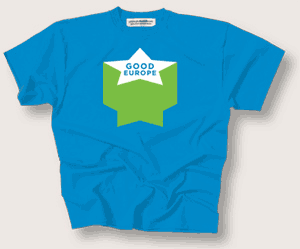
What is the point of the European Union?
01.03.2016
Sanjiv Sachdev of Philosophy Football reports on the launch ofGood Europe initiative
 Cold, winter Sunday evenings are not the most auspicious times to hold political seminars, yet this one was had a packed (and sleekly designed, Emirates funded) lecture hall of 400 people, with many more on the waiting list. In part, this was due to a panel featuring Yanis Varoufakis, the flamboyant and charismatic former Syriza finance minister of Greece– with the Guardian columnist, Zoe Williams and the Green Party MP Caroline Lucas.
Cold, winter Sunday evenings are not the most auspicious times to hold political seminars, yet this one was had a packed (and sleekly designed, Emirates funded) lecture hall of 400 people, with many more on the waiting list. In part, this was due to a panel featuring Yanis Varoufakis, the flamboyant and charismatic former Syriza finance minister of Greece– with the Guardian columnist, Zoe Williams and the Green Party MP Caroline Lucas.
The event was organised by the think tank Compass. The chair of Compass, Neal Lawson, opened the event with an eloquent summary of the ‘Brexit’ stakes – much higher than petty personal political ambitions of Boris Johnson and the spurious last minute deals of Cameron. Beyond the urgent need for European cooperation to tackle climate change, the spectre of global financial meltdown and pressing issues of migration and xenophobia, Neal contended that the referendum, like the Scottish one before it, offered an opportunity to re-imagine the kind of Europe we want. To this end Compass is seeking to build a network of activists, campaigners and politicians against Brexit and for a ‘Good Europe’ on June 23rd.
Caroline Lucas, who has an ability to articulate complex, sometimes dry, issues in a clear, vivid style, urged the widening of horizons – to examine what kind of people we are and what we want for our children, denouncing the narrow, dismal, dreary transactional view of the EU proposed by Cameron and instead arguing for an EU with sustainability and social justice at its heart. The latter could be the EU’s new ‘big idea’, as the former binding ideas of peace on the continent lose their potency and appeal. This would include an EU that was a global leader on renewable energy, that tackled wealth inequalities and fuel poverty – closing the gap between rich and poor (she noted that the Structural funds, if used imaginatively, provide the basis of such a redistributive mechanism). Caroline was well aware of the EU’s flaws but also recognised its positive potential – thus while corporations do wield far too much influence, the EU also led the world in the Paris climate change talks. She noted that the much criticised TTIP, would not be any better in a Cameron-led government bilateral negotiation – many of its more pernicious provisions were ones that his government either instigated or supported – leaving the EU would not improve trade policy. However, the need for greater accountability and transparency continued to be pressing. The EU needs reform but the main challenges we face today – from climate change, refugees, financial regulation and terrorism – continue to be cross border ones.
Zoe Williams also sought to shift our focus to what Europe could be rather than what it looks like now. She wanted us to imagine what a ‘good Europe’ would look like (citing Adorno’s maxim that we should discover not the past, but the dreams of the past) – seeing nascent signs of hope in the growing bonds between refugee charities and green groups. Zoe contended that the ‘Leave’ campaign had alienated broader discussion by its arcane focus on tedious intricacies and toxic untruths. She noted that ‘big dreams’ underpinned the EU – that of trade bonds displacing those of war. Moreover, the benign impact of the EU on matters like the environment and workers rights are tangible gains that need to recognised and celebrated – they would not have come from a UK government. The EU Commission’s proposals for refugees were far more humane than that of national governments, especially governments like that of Britain’s.
Academic Mary Kaldor warned of the return of fascism and war if the EU did disintegrate. Moreover, the EU role and capacity of taming globalisation in a globalised world will be neglected in the Brexit debate. Cross national entities are needed to deal with cross border problems – otherwise you have an unfettered globalised world.
Yanis Varoufakis entered the debate with a combative flourish. He contended that the EU was in an advanced state of disintegration – developing into a post-modern version of the 1930s, with borders being resurrected and the Euro fragmenting the EU economy. He drew parallels between the debt-fuelled crash of 1929 and its 2008 successor and the ‘clueless’ responses to both by European governments, as well as the past and current rise of the Far Right – strikingly evident now in Hungry, Poland, Greece and France but elsewhere in Europe too. Yanis called for an alliance of the Left, Liberals and Greens to fight this rising rightward tide – what the 1930s generation failed to do. The Democracy in Europe Movement 2025 (DiEM 25) launched earlier this month by Yanis seeks to reinvigorate the idea of Europe as a union of people ruled by democratic consent rather than by technocratic edict. This would seek to meet the challenges of the refugee crisis, climate change, the dearth of investment on a European basis, not a national one – the ‘cocoon’ of the nation state would be insufficient. But DiEM also sought to answer a question posed by the Right on the issue of sovereignty and legitimacy with greater democracy – the former model of economic integration leading to political union was no longer sufficient to this end.
In the subsequent discussion Caroline said that the Left should not be defensive in the Brexit debate; it was intriguing that the Right had no objection to pooling sovereignty when it came to NATO, TTIP or the WTO (World Trade Organisation) but raised hackles with the EU – and that we are going to be stronger if we work together. She noted that Sovereignty was a hollow thing if you have no power – to have influence you need to pool power for the common good. Yanis Varoufakis denounced Cameron as a politician of ‘no substance’ with his recent EU deal being characterised as ‘the mother of all Euro-fudges’; he characterised the Leave campaign as a ‘Burkean frenzy’ that wants to be part of the single market and engage in free trade – yet the former (as Norway and Switzerland know) requires adherence to common standards (environmental, labour etc) – ultimately a single market needs a single sovereignty. For him, the disintegration of the EU will accelerate unless greater democracy is injected into its workings. To this end DiEM would seeking to convene a constituent assembly from across Europe. Zoe was scathing as to the coarseness of the EU debate – in part due to an irresponsible right-wing media – with its demonology of faceless bureaucrats and hyper-fertile, lazy migrants. She addressed the issue of creating a common European identity as a counter to the inward turn of many national parliaments; the EU was the ‘only bastion of partial defence’ in a globalised world. Lucas ended with an elegiac, adapted quote from Arundhati Roy for a pan-European movement: ‘Another Europe is not only possible, but she is in her on her way, and on a quiet day I can hear her breathing’.
 Philosophy Football’s Good Europe campaign T-shirt is available from here
Philosophy Football’s Good Europe campaign T-shirt is available from here